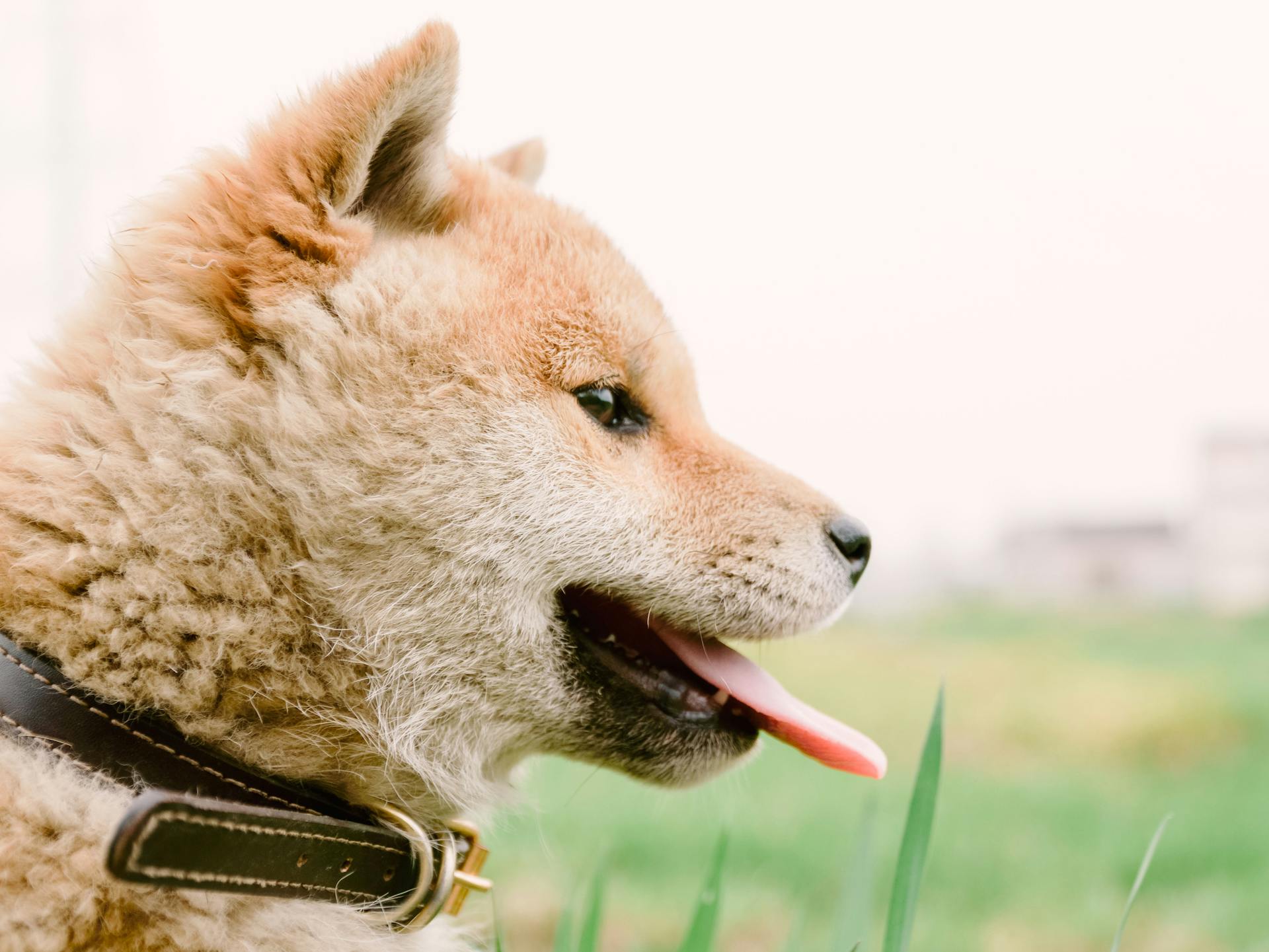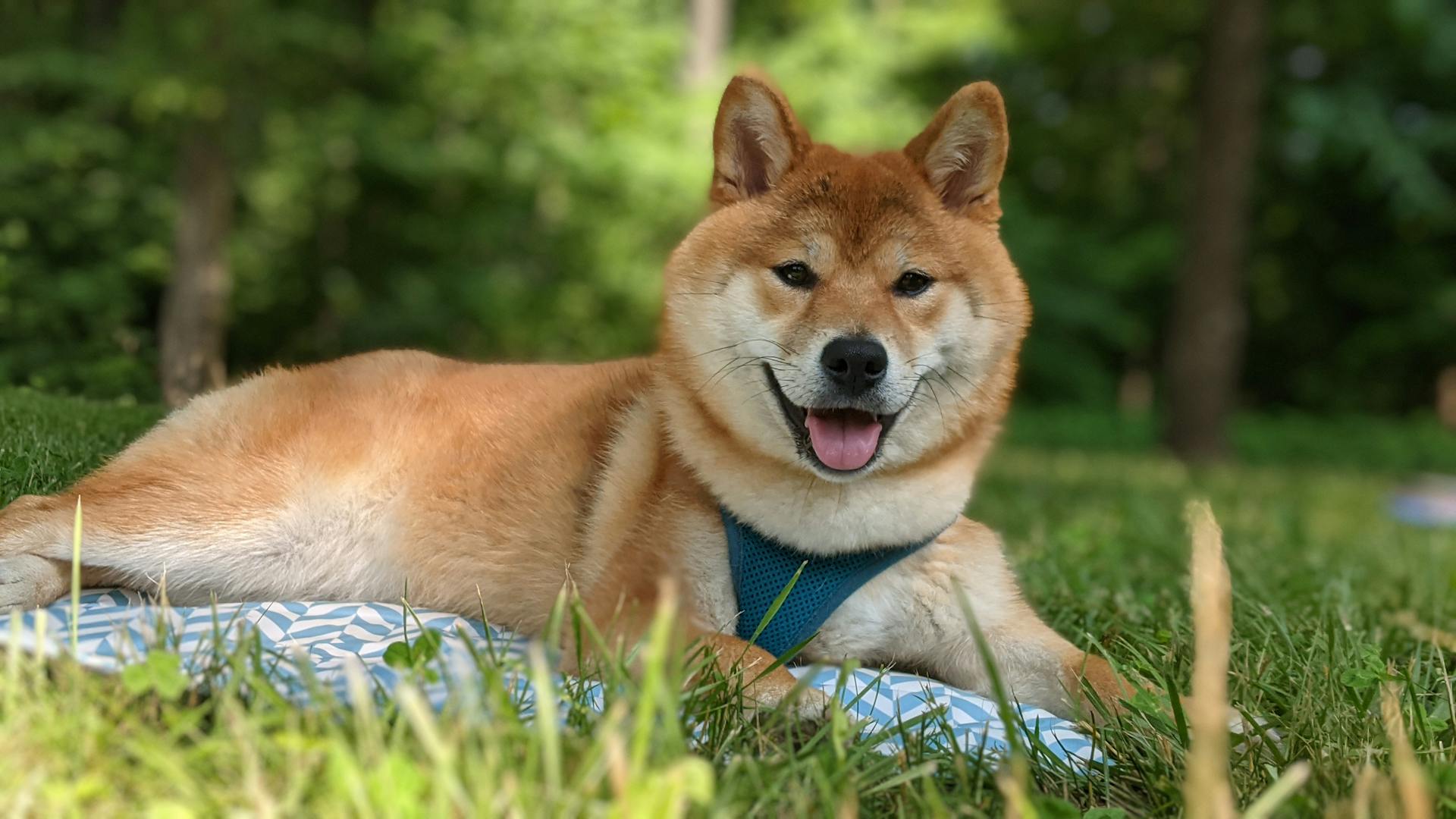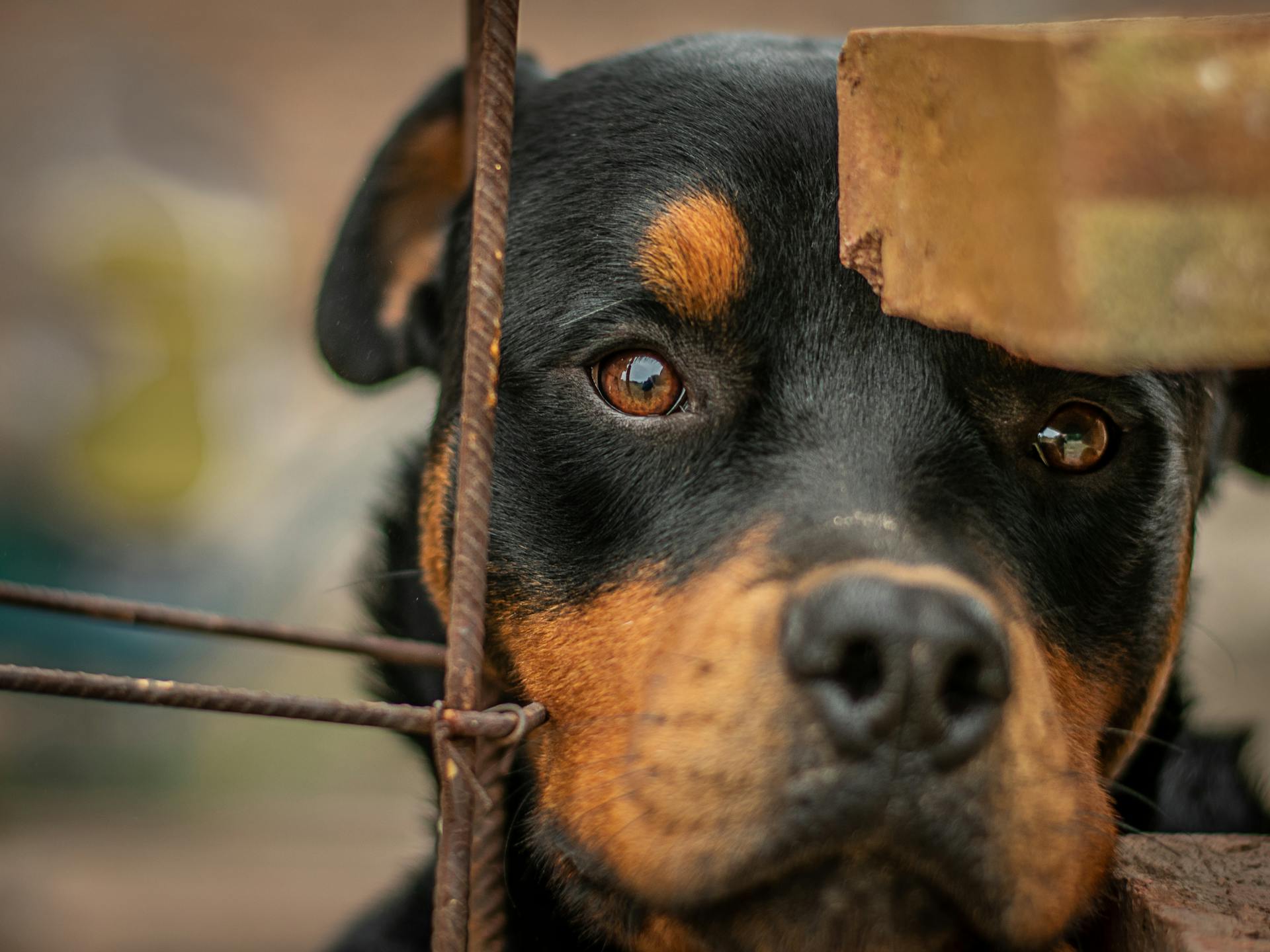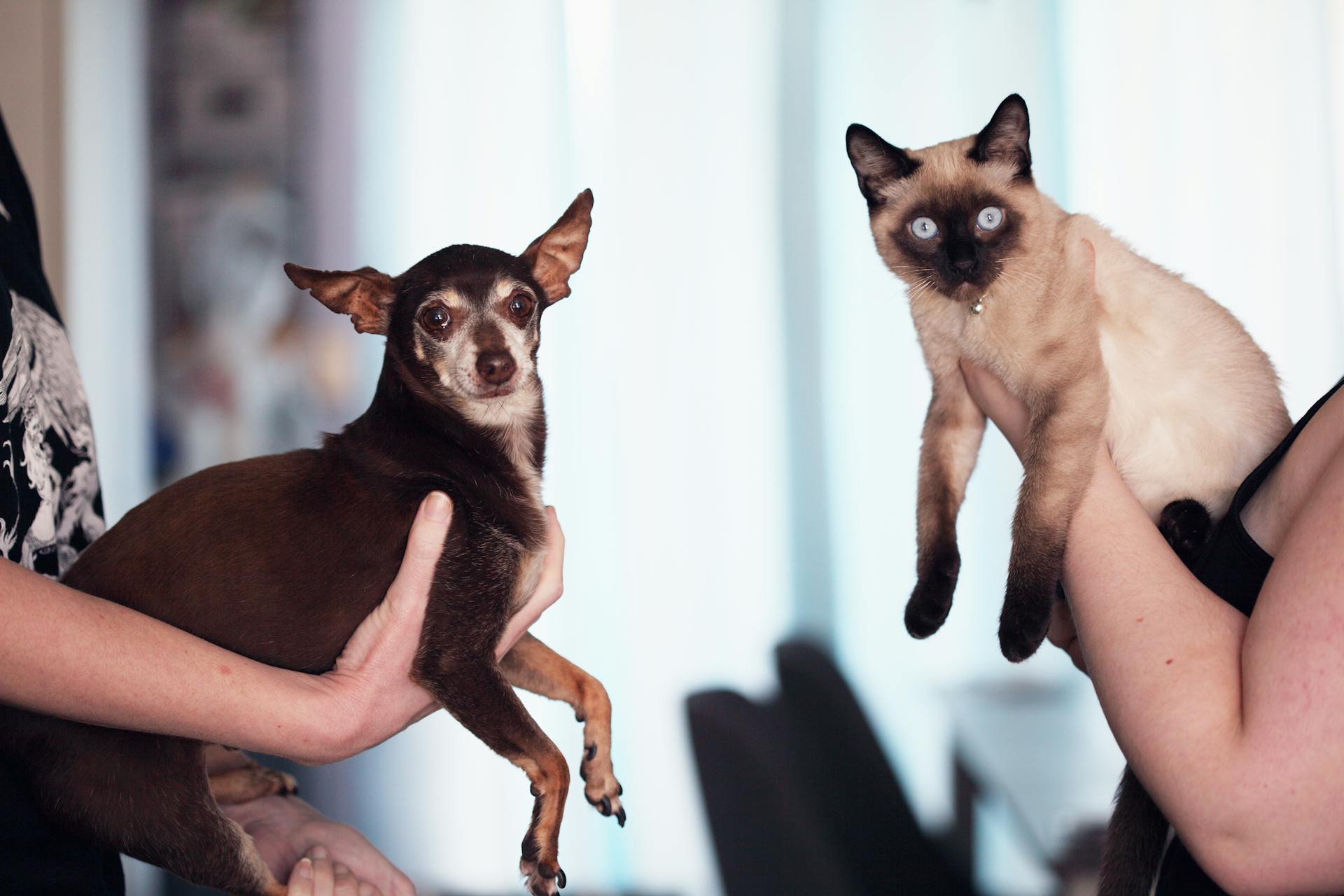
Shiba Inus can be quite particular about their social interactions, especially when it comes to other dogs. They have a strong instinct to defend their territory and family.
In general, Shiba Inus are not naturally pack animals, which can make it challenging for them to get along with other dogs. This is because they were originally bred to hunt small game in the mountains of Japan.
Socialization from an early age is key to helping Shiba Inus interact well with other dogs. If they're not properly socialized, they may become aggressive or fearful around other canines.
With patience, consistency, and positive reinforcement, Shiba Inus can learn to coexist with other dogs.
Understanding Shiba Inu Behavior
Shiba Inus are known for their strong prey drive, which can lead them to chase small animals like cats and rabbits. They were originally bred to hunt in Japan.
Shiba Inus are also fiercely independent and can be resistant to training. This is because they were bred to be self-sufficient and make their own decisions.
Their strong sense of loyalty and attachment to their family can make them wary of strangers, but also incredibly protective. In fact, Shiba Inus are known to be suspicious of anyone who isn't their immediate family.
Shiba Inus are naturally territorial and may defend their space from other dogs. They have a strong instinct to mark their territory with urine and feces.
Their unique communication style can sometimes be misinterpreted as aloofness. In reality, Shiba Inus are simply communicating in their own way, using body language and vocalizations to convey their emotions and needs.
Shiba Inus are highly intelligent and can learn quickly, but they require consistent and patient training. They thrive on routine and clear boundaries.
Socialization and Training
Socialization and training are crucial for Shiba Inus to get along with other dogs. It's best to start socializing your pup early, introducing them to dogs with friendly nature.
To train your Shiba Inu, you can take them to a training centre or hire a trainer to come to your home. Professional training is worth the investment, especially if your Shiba is a pup.
Training should be patient and consistent, focusing on simple one or two-worded commands like "come", "go", "stop", "leave it", and "eat." Don't give up or shout at your Shiba if they don't obey right away.
Early socialization also helps your Shiba Inu adapt to new environments and make new friends. You can start by walking your pup to a park with both loud and calm dogs around, practicing this strategy consistently.
If your Shiba is reluctant to socialize, don't force them. Listen to your dog and start fresh the next day, remaining calm and composed.
Train Him
Training your Shiba Inu is essential for a harmonious relationship. You can take him to a training centre or hire a trainer to come to your home.
Professional training may be more effective and efficient than doing it yourself. If your Shiba is a pup, training at home can be easier.
To socialize your Shiba, train him to interact with other pets. This will help him live with them peacefully.
Simple commands like "come", "go", "stop", "leave it", and "eat" are easy to remember and effective. One- or two-worded commands are best.
Patience is key when training your Shiba. Don't give up or shout at him if he doesn't obey commands right away.
Check this out: Adorable Home
Socializing with Your
Socializing with your Shiba Inu is crucial for their development and happiness. Early socialization is one of the best ways to help your pup get along with other dogs.
You can start by introducing your Shiba to dogs with a friendly nature. This exercise is imperative to teach your pup how to meet and make new friends and adapt to new environments. It's also a great way to help your Shiba become confident and calm in new situations.
To socialize your Shiba, start by walking them to a park with both loud and calm dogs around. Practice this strategy consistently so your pet gets used to the changing environment and interaction with new dogs daily.
Remember, Shiba Inus are intelligent and might pick up on your emotions, creating unnecessary problems. So, it's essential to stay calm and patient when socializing your Shiba.
Don't force your Shiba to socialize if they're feeling reluctant. Instead, start fresh the next day and try again. With time and consistency, your Shiba will learn to be calm and confident in new situations.
Exposure is also key to socializing your Shiba. Take them out at least 30 minutes every day to let them get used to other pets and humans. This will help them learn to see and interact with new things in a positive way.
Introducing to Other Dogs
Introducing your Shiba Inu to other dogs requires patience and careful planning. The first introduction matters, so choose a neutral ground where your Shiba Inu feels comfortable.
It's essential to keep a distance between your old Shiba Inu and the new one, and encourage the former to show positive behavior. If any dogs become reactive, use a strict command to tell them to calm down. Regularly keep your dogs in different spaces at home until they're happy with each other's company.
Introducing your Shiba Inu to a new dog from another breed can be rough, but if you're on neutral ground, they won't act as wildly as expected. You can also proceed to introduce the dogs in your yard, starting with leashes on and gradually removing them to allow some freedom.
Remember to note bad behavior from either side and show strictness where required, but refrain from hitting or shouting. Make sure no bullying is involved and that both dogs appreciate each other's presence with time.
Intriguing read: Shiba Inu Similar Breeds
Here are some key things to remember when introducing your Shiba Inu to other dogs:
- Choose a neutral ground for the introduction
- Keep a distance between the dogs initially
- Use positive reinforcement and strict commands to manage behavior
- Keep your dogs in different spaces at home until they're comfortable with each other
If you see that the dogs are now comfortable with each other, you can let them interact off-leash in an enclosed area. Give them time to sniff each other, and pay attention to their behavior to ensure they're playing peacefully.
Addressing Aggression
Having a Shiba Inu with other dogs in the house can be a challenge. Shiba Inus can be aggressive with other dogs, and it's not uncommon to see them chase small pets.
Resource-guarding is a common issue with Shiba Inus, where they become protective of their food, water, toys, and anything they own. This can lead to aggression towards other pets and people.
Early socialization can help, but it's essential to be cautious when introducing your Shiba Inu to other dogs. If you notice your Shiba Inu pulling the leash towards other dogs, it's a sign they want to attack.
Managing Aggression

Signs of aggression in Shiba Inus can be subtle, but it's essential to recognize them early on. Resource-guarding is a common sign, where your Shiba Inu becomes protective of his food, water, toys, or anything he owns.
You may notice your Shiba Inu barking at visitors, relatives, or even family members, which can be a sign of aggression. In severe cases, he may even attack anyone around him, including you.
Shiba Inus can be aggressive towards other dogs and pets, which can be detected when they pull the leash towards them or show a desire to attack. This can make it challenging to have other dogs in the same space.
Nipping at kids, frightening them, and baring his teeth are all signs of an aggressive Shiba Inu. His fur may stand straight as he barks at strangers, pets, or neighbors.
Early socialization can help manage Shiba Inu aggression towards other dogs. However, it's crucial to take safety measures to prevent any harm to yourself, your dog, or others.
To contain the aggressiveness of Shiba Inus, it's essential to control them so they never hurt themselves or others. You can do this by keeping them tied with a leash or in an enclosed area with a roof.
Recommended read: Aggressive Dog
Addressing Your Dog's Bad Behavior
Correcting bad behavior is key to addressing aggression in your Shiba Inu. Make sure to correct your dog's wrong behavior with a "no" as soon as you see them misbehaving with other pets.
You should be consistent with this practice to avoid confusing your dog. Consistency is crucial to help your dog understand what behavior is expected of them.
If your dog doesn't listen to you, divert their attention to other activities instead of shouting or yelling. This will help prevent further escalation of the situation.
Sources
- https://medium.com/@petscare40/shiba-inu-aggression-toward-other-dogs-and-effective-measures-to-take-7b7177318ad4
- https://www.dogster.com/dog-breeds/will-a-shiba-inu-be-good-with-another-dog
- https://shibainus.ca/chapter-00-the-misanthropic-shiba/chapter-17-shibas-and-other-pets/
- https://www.hepper.com/are-shiba-inus-good-with-other-dogs/
- https://www.norcalshiba.com/how-to-introduce-shiba-inu-to-other-dogs/
Featured Images: pexels.com


